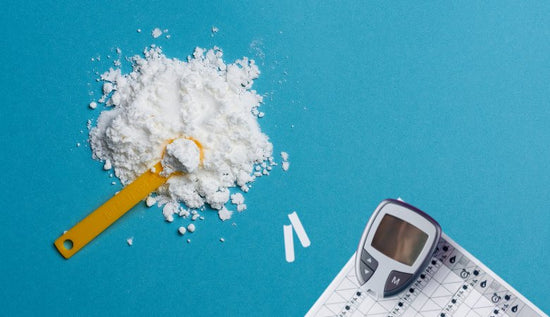
As fitness enthusiasts look for ways to seamlessly include supplements in their routines, one common question is: can you put creatine in coffee?
Yes, you can mix creatine with coffee, and many find it an easy way to take both, but there are some pros and cons. Combining creatine with coffee can offer a convenient energy boost, but caffeine’s diuretic effect might counteract creatine’s muscle hydration benefits.
Here, we explore the benefits of taking creatine with coffee, potential drawbacks, and other methods of mixing creatine to suit different lifestyles.
Key Takeaways
You can add creatine to coffee for a convenient pre-workout boost with synergistic benefits.
Some drawbacks are possible, such as an adverse effect on hydration.
Mixing creatine with coffee may not be right for everyone. Those who are sensitive to caffeine or easily dehydrated may not benefit from the combination.
What is Creatine?
Before exploring creatine and coffee compatibility, it’s helpful to understand what creatine is and its role in the body.
Creatine, naturally found in foods like meat and fish and produced in the liver, kidneys, and pancreas, supports energy production.
When performing high-intensity activities, such as weightlifting or sprinting, your body rapidly depletes adenosine triphosphate (ATP), the main energy source. Adding creatine to coffee or other routines can help replenish ATP, allowing for sustained energy, improved endurance, and better overall performance.
Creatine supplements are also popular for increasing muscle mass, strength, and endurance, making them a go-to for athletes and fitness enthusiasts alike.
Can You Put Creatine in Coffee?
The idea of mixing creatine with coffee appeals to many due to the convenience of blending two frequently used supplements into one drink.
Coffee is a popular natural stimulant known for its energizing effects and rich taste, while creatine is often mixed into water or juice as part of a workout routine.
But can you put creatine in coffee effectively? Yes, though combining creatine in coffee raises questions about its efficacy and possible interactions, such as whether the caffeine in coffee might impact creatine’s absorption or if the acidic environment affects its stability.
Creatine is not a stimulant, so it’s likely safe to mix with coffee. In other words, scientifically speaking, there's no inherent conflict between creatine and coffee. Both substances can be metabolized and utilized by the body independently.
However, some concerns arise when considering the nature of both supplements:
Will the acidic nature of coffee potentially degrade creatine molecules, thereby reducing its effectiveness?
Can caffeine, a primary component of coffee, interfere with creatine absorption or impact its efficacy during exercise?
Will each substance’s opposing impact on hydration cause a problem?
According to anecdotal reports, many individuals successfully incorporate creatine into their coffee without experiencing adverse effects. However, we want to address all three of these primary concerns to help you make an informed decision about your creatine and coffee consumption.
Let’s take a look:
The idea of combining creatine with coffee stems from the convenience of integrating two commonly consumed substances into one. Coffee is a staple beverage for many, prized for its stimulating effects and rich flavor.
Creatine, on the other hand, is typically consumed in water or juice as part of a pre or post-workout routine. However, mixing creatine with coffee raises questions about its efficacy and potential interactions.
Creatine is not a stimulant, so it’s likely safe to mix with coffee. In other words, scientifically speaking, there's no inherent conflict between creatine and coffee. Both substances can be metabolized and utilized by the body independently.
However, some concerns arise when considering the nature of both supplements:
Will the acidic nature of coffee potentially degrade creatine molecules, thereby reducing its effectiveness?
Can caffeine, a primary component of coffee, interfere with creatine absorption or impact its efficacy during exercise?
Will each substance’s opposing impact on hydration cause a problem?
According to anecdotal reports, many individuals successfully incorporate creatine into their coffee without experiencing adverse effects. However, we want to address all three of these primary concerns to help you make an informed decision about your creatine and coffee consumption.
Let’s take a look:
Does Coffee Degrade Creatine?
There's limited evidence to suggest that the acidic nature of coffee may potentially degrade creatine molecules, thus reducing its effectiveness. However, the extent to which this degradation occurs is not well-established in scientific literature.
Creatine is relatively stable in various pH environments, including acidic conditions, and its degradation primarily occurs under extreme conditions such as prolonged exposure to high temperatures or very low pH levels.
Coffee's pH typically ranges from around 4.85 to 5.10, which is mildly acidic. While this acidity may theoretically have some effect on creatine stability, the impact is likely minimal, especially considering the short exposure time when mixing creatine with coffee before consumption.
Moreover, the actual concentration of creatine consumed in a typical serving of coffee is relatively low compared to creatine supplementation doses, further mitigating concerns about degradation.
Overall, while the acidic nature of coffee could potentially affect creatine stability to some degree, current evidence suggests that any degradation would likely be minimal and unlikely to significantly impact its effectiveness when consumed together. In short, no, coffee won’t degrade your creatine quality to any impactful extent.
Does Caffeine Affect Creatine Efficacy?
Caffeine, as a primary component of coffee, has been studied extensively for its effects on exercise performance and metabolism. While some studies suggest that caffeine may enhance performance in various athletic activities, its interaction with creatine supplementation is less clear.
Modern evidence suggests that combining caffeine with creatine doesn't significantly impact athletic performance. A 2017 study found no notable differences in performance between groups consuming caffeine and creatine together and those taking them separately. However, participants experienced more digestive discomfort with the combined intake.
Another review in 2015 showed no interactions between caffeine and creatine, indicating their combination may enhance strength and power performance.
Nonetheless, conflicting reports persist, warranting further research. Individual responses vary, so it's crucial to consider potential side effects before supplementing. You can read "Does Caffeine Affect Creatine? The Best Way To Take Both."
Does Creatine and Coffee Affect Hydration?
Both creatine and coffee can have opposing effects on hydration, which may raise concerns when consumed together.
Creatine supplementation has been shown to increase intracellular water retention in muscle cells, which can contribute to short-term weight gain but may also improve exercise performance and recovery. On the other hand, caffeine, as a mild diuretic, can promote fluid loss through increased urine production.
When combining creatine with coffee, individuals should be mindful of their overall fluid intake to maintain hydration balance. Consuming adequate water throughout the day, apart from coffee consumption, can help offset any potential dehydration effects of caffeine and ensure optimal hydration for creatine absorption and performance benefits.
Considering the Blend: Pros and Cons of Creatine and Coffee
Pros
Enhanced Exercise Performance: Studies suggest that combining creatine with coffee after a loading phase may improve exercise performance compared to creatine alone.
Facilitates Hydration: Coffee provides the necessary fluids for proper digestion of creatine, simplifying pre-workout supplementation routines.
Prevents Weight Gain: Creatine can cause minuscule weight gain of 1-2 pounds due to water retention. Caffeine may help to reduce this effect because it acts as a diuretic, removing excess water from the body. Caffeine and creatine may even work together to support weight loss.
Convenience: Mixing creatine into coffee can streamline your pre-workout regimen, making it easier to incorporate both supplements into your routine.
Effective Dissolution: Creatine dissolves well in hot liquids, ensuring optimal absorption and utilization by the body.
Potential Carb Replenishment: Sweetened coffee can offer additional carbohydrates, aiding in the replenishment of muscle glycogen stores post-exercise.
Synergistic Benefits: Contrary to popular belief, a 2023 systematic review suggests that combining creatine and caffeine can enhance athletic performance during a maintenance phase, dispelling the myth of counteraction between the two compounds.
Cons
Reduction in Performance Benefits: The caffeine content in coffee may diminish the performance benefits associated with creatine during a loading phase.
Altered Flavor: Mixing creatine into coffee may alter the flavor, potentially affecting the taste of your preferred brew.
Delayed Absorption: Consumption of coffee with high-fat creamers before a workout may slow the absorption of caffeine and creatine, potentially impacting their effectiveness.
Mild Diuretic Effect: Coffee's diuretic effect, particularly if consumed irregularly, may cause mild fluid loss but should not significantly impact hydration status.
Potential Digestive Discomfort: While there are myths surrounding creatine causing stomach discomfort and dehydration, these concerns are unfounded. However, if you tolerate coffee well, stirring creatine into your brew is unlikely to cause digestive issues.
Not Suitable for Liver Disorders: Creatine may not be safe for those with liver or kidney disorders, and caffeine could compound these negative effects. Creatine is safe for the liver in most healthy adults.
In conclusion, blending creatine with coffee offers both advantages and disadvantages. Understanding these factors can help you make a decision that aligns with your fitness goals and individual preferences.
Alternative Ways to Take Creatine
Pre-workout Shakes or Smoothies
Blend creatine into your favorite pre-workout shake or smoothie for a convenient and palatable way to consume it before hitting the gym.
Mixing with Water or Juice
Creatine Capsules or Tablets
Creatine-infused Snacks or Foods
For those on the go or seeking precise dosage control, creatine capsules or tablets offer a convenient option that can be taken anytime, anywhere.
High Creatine Foods
Animal-based sources like red meat and fish, particularly herring, salmon, and beef, are rich in creatine. Incorporating these creatine rich foods into a balanced diet can help support muscle health and energy levels, but it's essential to consider overall nutrition and dietary needs.
Creatine is not available in many plant-based foods, so vegans and vegetarians may opt for a vegan creatine supplement.
Best Practices for Creatine Supplementation
Regardless of the method chosen, adhering to best practices for creatine supplementation is essential to maximize its benefits and minimize potential side effects:
1. Dosage Recommendations
2. Timing of Creatine Intake
While creatine can be taken at any time of day, some studies suggest consuming it post-workout may enhance its uptake by muscle cells. However, consistency in daily intake is more critical than timing.
Both creatine and coffee may impact sleep, so you may need to avoid them later in the day.
3. Potential Side Effects and Precautions
While generally safe for most individuals, creatine supplementation may cause minor side effects such as bloating or stomach discomfort. Some reports suggest that creatine may impact blood pressure, but this is atypical.
It's essential to stay hydrated and consult with a healthcare professional before starting any new supplement regimen, especially for those with pre-existing medical conditions or concerns. It may be safe to take creatine while pregnant but do so under your doctor's guidance.
4. Importance of Staying Hydrated
Conclusion
Mixing creatine with coffee is a convenient way to add both supplements to your daily routine. But can you put creatine in coffee effectively? Yes, you can, though there are some pros and cons to consider.
Combining creatine and coffee isn’t inherently problematic, but factors like the potential degradation of creatine in acidic coffee and how caffeine might interact with creatine absorption should be considered.
Still, many people report successfully blending creatine in coffee without any adverse effects. Just remember that individual responses can vary, so it's worth weighing the benefits and any potential drawbacks before choosing to mix creatine with coffee regularly.
Lucid beverages contain a blend of brain-boosting nootropics + powerful mushrooms designed to unlock your brain's full potential so you can zone in on what's important.
Ready to become lucid? Check out our starter kit.
FAQ - Creatine and Coffee
Can I mix creatine with my coffee?
Yes, you can mix creatine with coffee! Many people find creatine and coffee to be a great combination, as the caffeine in coffee provides an energy boost, while creatine supports endurance and muscle performance. Just stir well to ensure it dissolves properly.
Can I put creatine in hot drinks?
Yes, you can add creatine to hot drinks like coffee or tea. However, creatine may not dissolve as easily in very hot liquids, so stirring thoroughly is key.
What should you not mix creatine with?
Avoid mixing creatine with highly acidic drinks like citrus juices, as they may affect creatine’s stability. Additionally, while combining creatine and caffeine (like coffee) is common, be mindful of your caffeine tolerance to prevent jitteriness.
Does creatine dissolve well in coffee?
Creatine monohydrate, the most common form, can dissolve in coffee, though it may require extra stirring. Micronized creatine usually dissolves more easily and is ideal if you’re mixing it with coffee.
Does heat destroy creatine?
Moderate heat, like that in coffee, shouldn’t destroy creatine, so it’s fine to add to warm beverages. However, extremely high temperatures may reduce its effectiveness slightly, so adding it to drinks just below boiling is best.
How much creatine is safe for the kidneys?
For most healthy individuals, 3–5 grams of creatine daily is considered safe. However, those with kidney concerns should consult their healthcare provider before starting creatine to ensure it’s a good choice.
Resources
“Creatine and Caffeine: Considerations for Concurrent Supplementation” https://pubmed.ncbi.nlm.nih.gov/26219105/
“Effects of coffee and caffeine anhydrous intake during creatine loading” https://www.ncbi.nlm.nih.gov/pmc/articles/PMC4808512/






